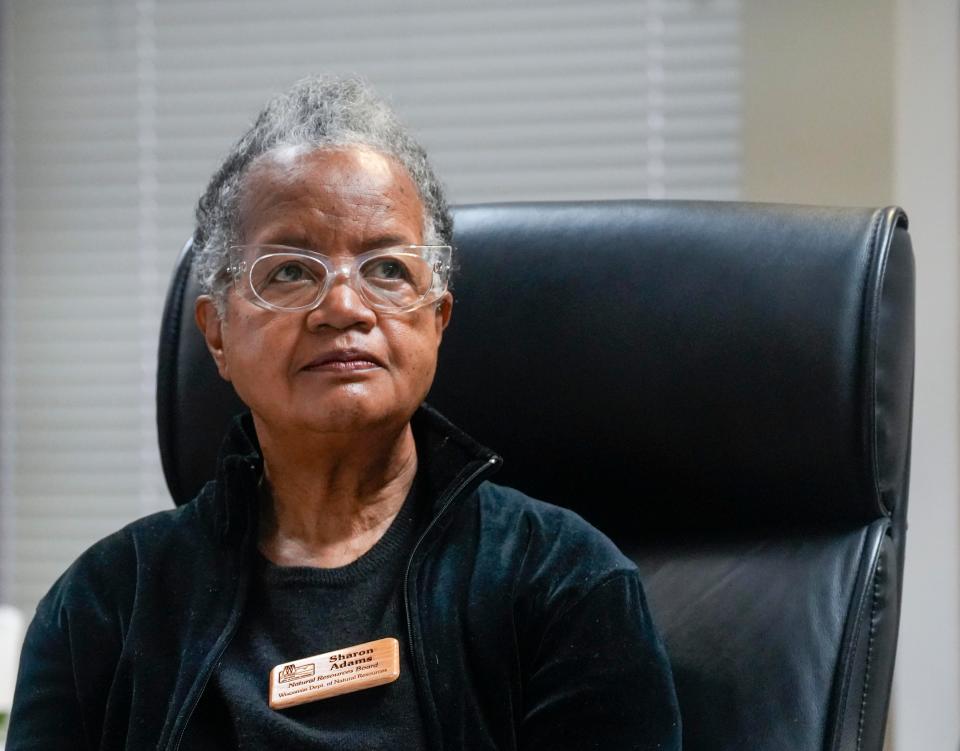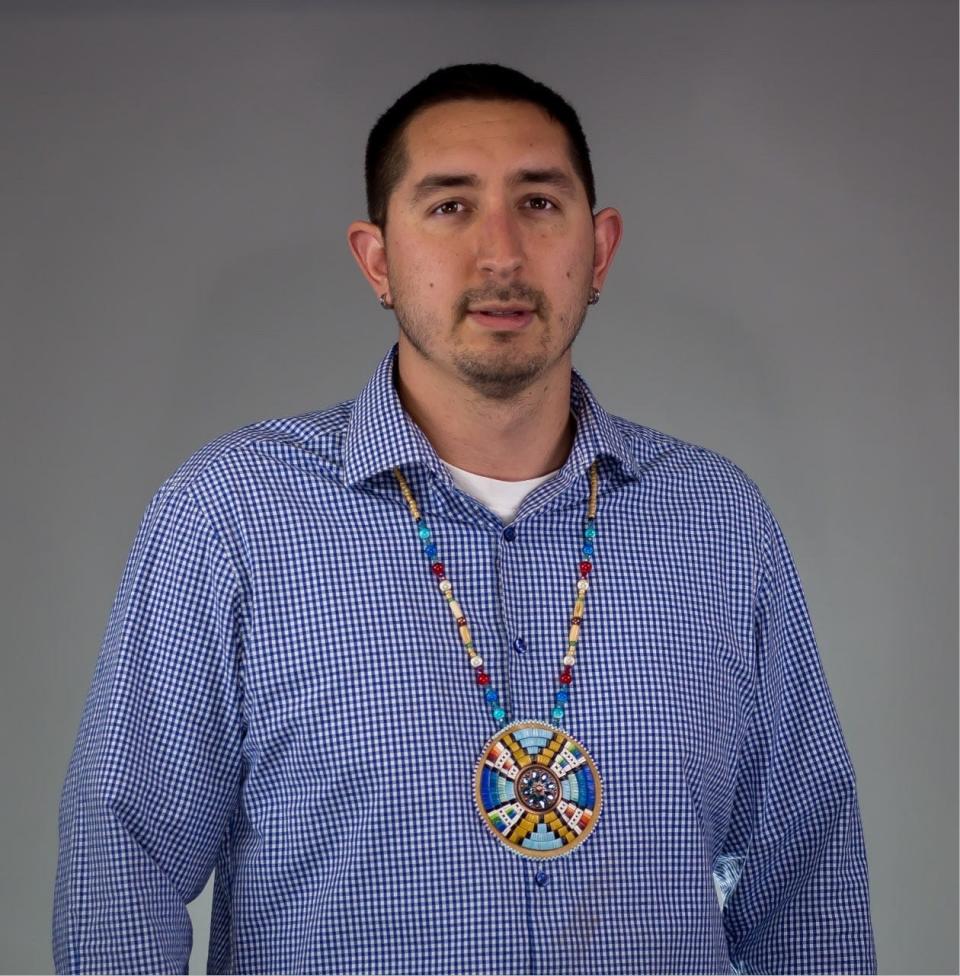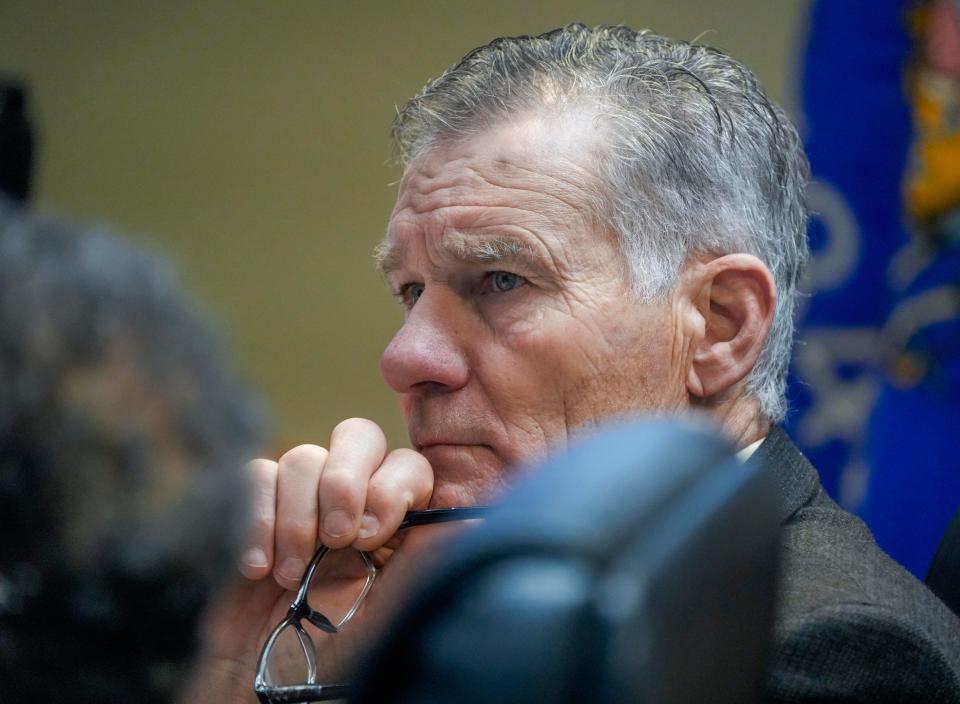Natural Resource Board appointees respond to questions on wolves, PFAS in confirmation hearing
- Oops!Something went wrong.Please try again later.
MADISON – Members of the state Senate grilled several of Gov. Tony Evers' appointees to the Natural Resources Board Wednesday, specifically seeking answers about whether they would vote yes on a wolf hunt in coming years, their views on "forever chemicals," and whether the appointees had enough experience with agriculture, hunting and fishing.
The members of the Senate Committee on Financial Institutions and Sporting Heritage held a public hearing for appointees Sharon Adams, Dylan Jennings and Paul Buhr. Evers selected Adams more than two years ago but had not been given a hearing, while Buhr and Jennings were appointed this year.
Here's what you should know.
How appointees would vote on a wolf hunt?
The possibility of a wolf hunt was a large focus for committee members who questioned the appointees on whether there should be a population goal in the wolf management plan the DNR is working to create.
Sharon Adams, the founder of Milwaukee nonprofit Walnut Way, said she was "strongly committed" to a management plan.
"I think we're still in the process of deciding if there should be a goal, and what that goal should be," she said. "So I'm listening to our residents. I'm also wanting to make sure that we're doing everything we can to reach good goals, and practices and procedures that are sustainable."
Paul Buhr, who up until his recent retirement farmed and raised cattle and owned a dairy farm for 45 years, said that while many farmers struggle with wolves, there is going to have to be a way to maintain a sustainable number of wolves in the state, much like the state has done with the bear population.
More: With two new members, and one conflict in the past, here's the Natural Resources Board
"But I am in favor of a wolf hunt," he said.
Dylan Bizhikiins Jennings, a member of the Bad River Ojibwe Nation in northern Wisconsin, said he would rely on his science and environmental background, making sure he looks at all of the data and information available, as well as taking into account the desires of residents.
"We're in unprecedented times, where a lot of these species that have been extirpated are now making a comeback," he said. "I mean, I could go either way on it, to be honest with you."
Sen. Rob Stafsholt, R-New Richmond, in particular focused on Jennings' former role as the spokesperson for the Great Lakes Indian Fish and Wildlife Commission and a lawsuit filed by a number of Indigenous tribes that halted the wolf hunt in Wisconsin in recent years. He asked if that lawsuit would be something that influenced Jennings' future decisions about a hunt.
He asked the members of the committee to consider that in his previous role he was representing the position of tribal community members.
"For a lot of our Ojibwe communities, Ma'iingan, or wolves, have a really strong cultural significance. So much so that many of our communities believe that the demise of any wolf population means the demise of tribal communities. I don't think that the tribes by any means are wrong in trying to protect those belief systems that they have, especially since they've been a part of this environment for hundreds of thousands of years," he said
"But I don't allow my own personal beliefs and where I come from to get in the way of working in representing a more broad, diverse group of constituents."

Who is responsible for PFAS?
Adams said she believed there should be government support for dealing with PFAS, given the size and depth of the issue, but that the government isn't the only one responsible.
"I think that we will find out over time who and what is mostly contributing to it, and I think that should be a route that is viewed," she said.
Jennings wasn't directly questioned about PFAS but said during his testimony that looking to the science and research should govern the state's response.
"It was not too long ago where PFAS wasn't even on our radar, as a nation or a state," he said. "And now science has shown that it is really damaging to not only health but our environment."
Buhr said cleanup should be a joint effort between polluters and the government.
"If companies were found to conceal that they knew things about PFAS, then they are part of the problem and they should be part of the payment solution," he said.

What's the overall role of the Natural Resources Board?
Jennings said the role of the board is largely to work to develop and implement policies in a way that takes into account the needs and desires of residents.
"For the most part, a lot of us do just really want to make sure that we have a clean environment for our next generations to benefit from," he said. "We have to figure out how, and find nuanced ways to achieve that."
Adams said, too, that her role would be to make sure residents have a voice in regulations.
"Making sure that the residents are represented and that the rules and regulations give sustainability to our natural resources and the economic impact that that may have," Adams said.
Buhr, who was selected as the agricultural representative of the board, said he would seek to ensure the viewpoints of farmers are considered with every decision, along with advocating for the health of natural resources.
"The overarching goal of the Department of Natural Resources is to make sure that every citizen has clean air, clean water and places to recreate, and that our game and fish are managed in a sustainable manner," he said. "And I think that that that will be part of my goal also."

Do the appointees have experience with agriculture, fishing and hunting?
Buhr brings his long history with farming to the role but he emphasized that also is an active sportsman as an angler and participates in his son's hunting party each fall.
Adams grew up with a family experienced in farming, she said, and often traveled the state fishing with them, a hobby she continues.
"That's the peace time, you know?" she said of fishing.
While she doesn't hunt, she did grow up watching her family members hunt and eating the fruits of those labors.
Jennings said that while he doesn't have direct experience with agriculture, he did grow up harvesting wild rice, fishing and hunting with his family.
"I couldn't live without it, to be honest," he said of hunting and fishing. "It's very much a part of our day-to-day life, and engrained in my kids and my family."
How is the NRB constituted?
The Natural Resources Board sets policy for the Department of Natural Resources and is made up of seven members. Board members are nominated by the governor for six-year terms, staggered to prevent boards from being appointed within one governor's term.
Under the law, three members are appointed from the northern part of the state, three from the south and one member is "at large." At least one board member must have an agricultural background and at least three members must have held a hunting, fishing or trapping license in at least seven of the 10 years before nomination.
Members are confirmed by the state Senate, which reserves the right to reject appointments by the governor. But to take a seat on the board, appointees don't need to be confirmed, as long as the member they're replacing vacates the seat.
More: Tony Evers puts his stamp on the Natural Resources Board with 3 new appointees
What was the controversy surrounding the board the last several years?
Though board meetings this year have proceeded with no clashes, the last several years have been marred by controversy. In 2021, when Frederick Prehn's term expired, the Wausau dentist refused to step down from his seat, creating months of infighting between the Walker and Evers appointees. Though Prehn's decision was upheld by the state Supreme Court, other members of the board and members of the public decried Prehn's decision and pushed for his exit.
The state Senate contributed to the conflict by refusing to hold a confirmation vote for the new appointee.
Prehn held the seat for nearly two years past its expiration date, only to quietly step down at the end of December, with no explanation. At that point, Sandra Dee Naas, who Evers had selected for Prehn's spot, was able to take her seat. Naas has still not been given a confirmation hearing.
Are there still issues?
Even with less disagreement on the board itself, there are still challenges. Four of the members remain unconfirmed, and earlier this year Senate Majority Leader Devin LeMahieu cast doubt on Evers' appointees to the board, saying that they seemed "political" and "maybe don't have the background" to be on the board. In addition to Adams, Buhr, Jennings and Naas, member Jim VandenBrook is also not confirmed.
It is unclear when hearings for Naas and VandenBrook will be held.
Board Chair Bill Smith was confirmed after his appointment in 2019, and Vice-Chair Marcy West was confirmed shortly after her appointment in 2020.
More: Scott Walker appointee Frederick Prehn resigns from Natural Resources Board after over-staying term
Laura Schulte can be reached at leschulte@jrn.com and on Twitter at @SchulteLaura.
THANK YOU: Subscribers' support makes this work possible. Help us share the knowledge by buying a gift subscription.
DOWNLOAD THE APP: Get the latest news, sports and more
This article originally appeared on Milwaukee Journal Sentinel: Evers NRB appointees weigh in wolves, PFAS during confirmation hearing

